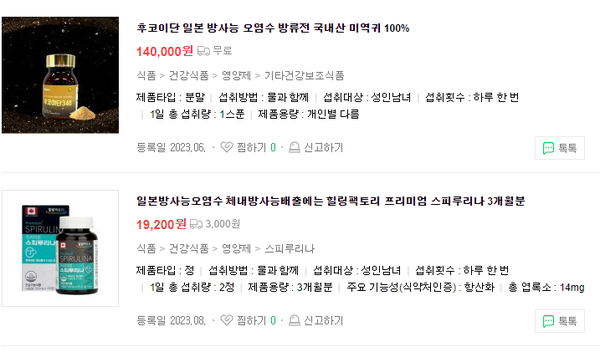As worries increase among the public in Korea regarding potential radiation exposure due to Japan's choice of releasing treated radioactive water from the afflicted Fukushima nuclear plants into the Pacific Ocean, some health functional food makers are capitalizing on these concerns to generate profits.

In particular, numerous Korean internet cafes and online communities are progressively sharing advertisements asserting that iodized seaweed and dietary supplements have the potential to assist the body in mitigating and eradicating radiation effects.
However, these claims are questionable at best and potentially dangerous at worst.
According to a local expert, the prompt consumption of an iodine pill subsequent to notable radiation exposure can diminish the likelihood of accumulating radioactive iodine and, consequently, thyroid cancer. However, its efficacy in relation to the radioactive water discharged in Japan remains uncertain.
"This is primarily due to the fact that the water holds minute quantities of radioactive iodine, given that 13 years have passed since the Fukushima nuclear disaster in 2011," remarked Professor Chung Bum-jin from the Department of Nuclear Engineering at Kyunghee University College of Engineering appearing on TV Chosun, a local pay television network and broadcasting company.
The Ministry of Food and Drug Safety (MFDS) has also been vocal in differentiating between the effects of iodine-containing dietary supplements and iodine pills.
Iodine dietary supplements are designed to address iodine deficiency and not to combat radiation exposure, the ministry said.
"The iodine-containing dietary supplements on the market are meant to supplement the iodine deficiency in the body, and advertisements claiming efficacy and effectiveness in removing radioactivity from the body are false and exaggerated advertisements that take advantage of consumer anxiety," the MFDS said. "Therefore, people should not purchase these products."
The ministry further emphasized that indiscriminate iodine consumption can be harmful, particularly if the radioactive substance is not iodine-based. Moreover, an excessive intake of iodine can result in negative health consequences.
"Some of the indications of an iodine overdose encompass discomfort in the mouth, throat, and abdomen, along with fever, nausea, and vomiting," clarified the ministry. "Sustained consumption beyond the suggested limits may trigger thyroid irregularities, possibly leading to conditions such as hyperthyroidism."
Thus, it is essential for consumers to understand that while seaweeds like sea mustard and kelp are rich in iodine, and iodine is vital for thyroid hormone production, there are risks associated with consuming too much, the ministry said.
The prescribed dietary allowance (RDA) for the majority of adults stands at 0.15 mg per day, according to MFDS. It also discouraged any consumption surpassing the maximum daily intake of 2.4 mg, which is the safety threshold established for humans.

